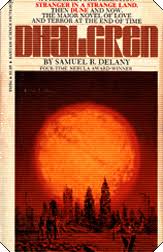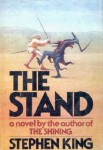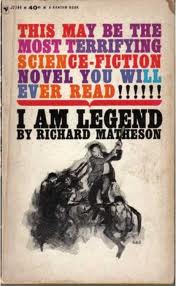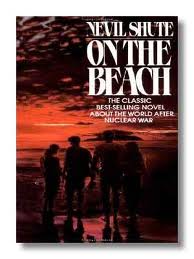(In 2009 I wrote a two-week series of blog posts about post-apocalyptic novels & films for Borders’ blog. Because this subgenre has continued to flourish, I am reprinting the posts here.)
Before talking about why postapocalyptic fiction and films are appealing, I’d like to take the next few entries to offer up some books and movies I think are standouts in the field. It’s an opportunity to give you a sense of my sensibility (tres clever, no?) and to present some works I think have been either overlooked or not normally included amid all the clang and clamor that is the end of the world as we read it.
 Dhalgren, Samuel R. Delany. One of my favorite novels and the book that made me want to write for a living. A very contained apocalypse, really, concerning an American city that has been cut off from the rest of the world. Depopulated, burned, transmogrifying, the city is as much a character as any of its memorable inhabitants. Buidings burn but are not consumed, landmarks and locations seem to shift, twin moons and a giant sun rise, gangs and communes dominate, laws and social conventions are largely ignored. Not the most accessible book in the world, but the craft and power of Delany’s prose here are some of the best you’ll ever read.
Dhalgren, Samuel R. Delany. One of my favorite novels and the book that made me want to write for a living. A very contained apocalypse, really, concerning an American city that has been cut off from the rest of the world. Depopulated, burned, transmogrifying, the city is as much a character as any of its memorable inhabitants. Buidings burn but are not consumed, landmarks and locations seem to shift, twin moons and a giant sun rise, gangs and communes dominate, laws and social conventions are largely ignored. Not the most accessible book in the world, but the craft and power of Delany’s prose here are some of the best you’ll ever read.
 The Stand (original version), Stephen King. The broad cast of wonderfully developed characters and sheer epic scale of The Stand make it the Lord of the Rings of end-of-the-world novels. A weaponized superflu virus with a 99.9% mortality rate gets loose and reduces humanity to birdfood in weeks, setting the stage for a bliblical confrontation between opposing forces of survivors. (This novel is also one of the few good-vs.-evil conflicts I can stomach.) King walks you through the whole process from initial outbreak to post-confrontation aftermath with a level of realistic detail that is absolutely irresistible in a story that manages to attain the level of myth. One gets the impression ensuing generations will add the account as a third book of the Christian bible.
The Stand (original version), Stephen King. The broad cast of wonderfully developed characters and sheer epic scale of The Stand make it the Lord of the Rings of end-of-the-world novels. A weaponized superflu virus with a 99.9% mortality rate gets loose and reduces humanity to birdfood in weeks, setting the stage for a bliblical confrontation between opposing forces of survivors. (This novel is also one of the few good-vs.-evil conflicts I can stomach.) King walks you through the whole process from initial outbreak to post-confrontation aftermath with a level of realistic detail that is absolutely irresistible in a story that manages to attain the level of myth. One gets the impression ensuing generations will add the account as a third book of the Christian bible.
Though I’ve linked to the uncut version because it’s the only one in print, I highly recommend the original published version instead, because, frankly, King is a writer who enormously benefits from editorial direction and tightening; sadly, those days seem long behind him.
 I Am Legend, Richard Matheson. A classic across the board, and deservedly so. Often imitated but never duplicated, Matheson’s novel was the first to breathe new life into hoary old eurotrash vampire lore, treating it with relentless logical sensibility as a communicable virus that kills most people and transforms those remaining into seemingly mindless bloodsucking ghouls. Robert Neville is the lone human being unaffected, and his everyday struggles simply to maintain in the face of futility are beautifully told and heartbreaking. (Trivia: I set the Change in Ariel at 4:30 as a nod to Neville ruminating over a clock stopped at 4:30 in I Am Legend.) Adapted with varying success as the movies The Last Man on Earth (with Vincent Price), The Omega Man (with Charlton Heston), and I Am Legend (with Will Smith), the novel still stands as a monolith never rendered in another medium with its original power. It also has one of the best final paragraphs ever written.
I Am Legend, Richard Matheson. A classic across the board, and deservedly so. Often imitated but never duplicated, Matheson’s novel was the first to breathe new life into hoary old eurotrash vampire lore, treating it with relentless logical sensibility as a communicable virus that kills most people and transforms those remaining into seemingly mindless bloodsucking ghouls. Robert Neville is the lone human being unaffected, and his everyday struggles simply to maintain in the face of futility are beautifully told and heartbreaking. (Trivia: I set the Change in Ariel at 4:30 as a nod to Neville ruminating over a clock stopped at 4:30 in I Am Legend.) Adapted with varying success as the movies The Last Man on Earth (with Vincent Price), The Omega Man (with Charlton Heston), and I Am Legend (with Will Smith), the novel still stands as a monolith never rendered in another medium with its original power. It also has one of the best final paragraphs ever written.
 On the Beach, Nevil Shute. The end of the world as airport novel, Shute’s 1957 classic centers around the last remaining American submarine crew reaching Australia ahead of the inevitable clouds of lethal radiation in the aftermath of a full-scale global thermonuclear war. Shute doesn’t focus on the war itself, and the novel is all the more powerful for that, essentially treating Australia as a kind of RMS Titanic in which every look, line, and love is colored by the approaching iceberg of humanity’s fate. Wonderfully fatalistic, the depictions of society’s slow unraveling are haunting and memorable. The Stanley Kramer film, starring Gregory Peck, is also highly recommended (though after seeing it you’ll never want to hear “Waltzing Matilda” again).
On the Beach, Nevil Shute. The end of the world as airport novel, Shute’s 1957 classic centers around the last remaining American submarine crew reaching Australia ahead of the inevitable clouds of lethal radiation in the aftermath of a full-scale global thermonuclear war. Shute doesn’t focus on the war itself, and the novel is all the more powerful for that, essentially treating Australia as a kind of RMS Titanic in which every look, line, and love is colored by the approaching iceberg of humanity’s fate. Wonderfully fatalistic, the depictions of society’s slow unraveling are haunting and memorable. The Stanley Kramer film, starring Gregory Peck, is also highly recommended (though after seeing it you’ll never want to hear “Waltzing Matilda” again).
More books tomorrow, and then we’ll cover movies.